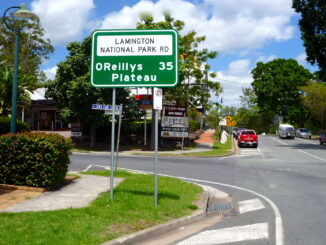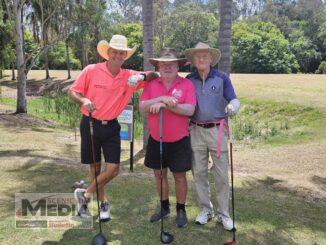
DURING the late sixties and early seventies Canungra was a very small township with a hotel – whose publican’s wife had the beautiful Christian names of Gertrude Pansy May.
Other services in town included a grocer, bakery, service station, three churches, a butcher, Harry’s café (now ‘The Outpost Café’), the Post Office and manned telephone exchange(which resided where My Country Escape and Canungra Hardware are now), a police station, TV sale shop, a primary school, Bowls club, about 25 houses and a branch of the Commercial Bank of Australia (where The Shoe Vault is now).
It was at the bank that I had my first away from home (Brisbane) working experience at 17 years old (I am now rising 84). I was the ledger-keeper; all the recording was done by dipped pen and ink with blotting paper, no calculator was provided but the boss had a typewriter.
The reason for the establishment of Canungra may have been for the felling and milling of the large stands of cedar and hoop pine, but the sawmill was long gone when I worked there.
Dairying and fat cattle became the prime source of employment during this time.
Exploitation of our native timbers has been a sorry story in Australia. The pine and cedar forests cut out first because the hard woods left were not as easy to work. Much of the cedar was exported to Europe and provided a great export income (and sailing ship ballast) for our then young nation. Australian cedar is one of the world’s most sort after furniture timber.
Here’s sad story an old timber-getter told me: because of the hilly terrain, the large girth and height of the trees (most over one hundred feet) and having to haul the logs by bullock train, trees (felled by axe) were made into logs, cut with cross-cut saws into three parts.
The bottom portion was too large for a bullock or horses to haul, so they were left to rot on the ground. The top was also left to rot as the timber would have too many knots. The middle was the only section that remained for milling as the cut timber was free of knots. Today, most pine is grown in plantations where all of the tree is kept, including the bark and branches. These trees are harvested when very small, most of the trees are rendered into wood chip.
Electricity was supplied to the township but not to many of the outlining areas. While I lived there, the power was extended into Flying Fox. One day a Flying Fox farmer came into the bank branch and recounted that it was still hard to believe that all he had to do was press the switch on the wall and the light would come on.
The bank was in Pine Street (now known as Christie Street), it was situated between the Post office and the Bank boss’ residence, across from the service station and butcher. We were a staff of four – boss (manager), teller, ledger-keeper and agency clerk/assistant ledger-keeper.
The three lesser Bank Johnnies lived in a small room just off the banking chamber. There were no kitchen facilities, there was only enough room for three beds, a hand basin and a small upright wardrobe. We had to move into the chamber to get dressed. The EC (earth closet/dunny) and shower were in the backyard in rooms that were attached to the one car garage (now “Cafe Metz”). The shower was connected to the town’s cold-water supply, we had no hot water. For those who know, Canungra will agree that it gets bitterly cold in winter. Morning showers were hard work. The town does not enjoy the sun until almost noon because of the shadow cast by the Tamborine Mountain Range east of the town. The town water supply was pumped from Canungra Creek with no treatment, the publican had the contract with the council to man the pump. While the boss had a very nice large home, we lived in Spartan conditions. It was our own choice, we did it to save money; we could have found billets. As I was only a junior my weekly wage (take home) was five pounds and sixpence ($10.05) after paying ten shillings ($1.00) income tax. All meals were taken at the cafe or pub.
The other two staff and I enjoyed playing cards. On three nights a week a euchre game was conducted at three of the outlying halls. These halls were called “Memorial Hall” or “School of Arts”. Memorial Halls were built throughout Australia, financed by the Federal Government after World War One to make jobs, as well as in memory of the men and women who served. Many of these halls have survived and it is not unusual today to pass one in remote or unexpected places. The best part of these nights was the break for a cup of tea. My memory is still very clear on how good those cakes and biscuit were – all baked in wood burning stoves.
For a small bank in a small town, it had many more out of the ordinary happenings than other branches – here’s a couple of examples.
Canungra Branch like all branches was issued with a pistol. There was an unwritten rule amongst the staff – “When cleaning the gun it had always to be pointed at the Boss’ office.” He knew this as he would have been a young bloke in the bank sometime. Well, one day the teller whose job it was to clean the gun was doing so and the bloody thing went off. The whole of the staff froze. Fortunately, there were no customers in the building at the time. After a stunned silence it was found that the bullet only travelled about three or four meters and hit the pine architrave to the Boss’ office door. It made only a small dent and fell to the floor. It was good the bank didn’t supply quality ammo. Such a bullet would have given a robber only a nasty bruise. However, one of the Bank’s proper rules and the law was not to shoot anybody, just hand over the money. When everyone started breathing again and hearts stop racing the boss said, “At least you were pointing it in the proper direction.” The boss in his wisdom did not bother to mention the matter in his weekly report to Head Office. Look next time you go into the shop and see if the dent is still there.
The building was old then and had a timber floor built on stumps about sixty centimetres above the ground. One weekend when all the staff were away two blokes decided to crawl under the building and cut a hole, forty-five by forty-five centimetres in the flooring. This would have been difficult as they only had hand tools and a small space to work in. They were able to get in but found that they could not open either of the safes or able to carry them away. Also they were not able to open the dead locked doors to get out so they had to leave the same way they entered. They were never caught. The repaired portion of the floor is still evident today in the ‘Shoe Vault’.
The next story is hard to believe but it did happen.
To get to O’Reilly’s National Park Resort from Brisbane travellers had to pass through Canungra. A service car provided the regular return service every Monday, Wednesday and Friday. The service car was a “De Soto” sedan, 1948 model. It had been altered so that there were three doors on each side creating three bench seats capable of carrying eight passengers and the driver. It may have been one of Australia’s first stretch-limos. The car would arrive in town at about the same time the bank opened at 10am.
One day, and this is the part that’s hard to believe, a man got out of the car, and walked into the bank. With what looked like a gun held under a jumper, he held up the bank and walked out with cash in a cloth bag. He then walked up to Harry’s Cafe, about fifty metres away and ordered a meal. The boss rang the police, the sergeant and constable went to the cafe arrested the bloke. The money was handed back. Then another funny thing happened – Harry got cranky and wanted to know who was going to pay for the uneaten meal. No one volunteered.
The robber was going to wait for the return of the service car at about 4pm then head back to Brisbane. He was either the dumbest bank robber in the history or he wanted to get caught and go to jail. There was no gun only a small piece of piping. The teller’s balance was correct at the end of the day’s trading. Those who were there will never forget it, thanks to a foolish, hungry, but almost honest bank robber.
Times change and so has Canungra. I enjoyed my couple of years living there. My fondest memories include the wonderful aroma that all townspeople enjoyed each morning – the pall of delight from the baker’s oven. Once all country towns had a baker, it’s sad that kids today have missed out. No matter how hard one inhales at Woolworths or Coles it doesn’t work.
By Bob King





